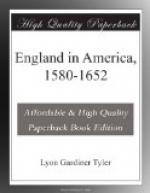The desire of Massachusetts appeared to be to hold the heretics and their new country under a kind of personal and territorial vassalage, as was interestingly shown in the case of Mrs. Hutchinson and Samuel Gorton. Despite her banishment and excommunication the church at Boston seemed to consider it a duty to keep a paternal eye on Mrs. Hutchinson; and not long after her settlement at Portsmouth sent an embassy to interview her and obtain, if possible, a submission and profession of repentance.
The bearers of this message met with an apt reception and returned very much disconcerted. They found Mrs. Hutchinson, and declared that they came as messengers from the church of Boston, but she replied that she knew only the church of Christ and recognized no such church as “the church of Boston.” Nevertheless, she continued to be annoyed with messages from Boston till, in order to be quiet and out of reach, she removed to a place very near Hell Gate in the Dutch settlement, and there, in 1643, she, with most of her family, perished in an Indian attack.[8]
The authority of Massachusetts over the banished was not confined to religious exhortations. Samuel Gorton, a great friend of Mrs. Hutchinson, was in many respects one of the most interesting characters in early New England history. This man had a most pertinacious regard for his private rights, and at Plymouth, Portsmouth, and Providence his career of trouble was very much the same. But he was not an ordinary law-breaker, and in Providence, in 1641, Gorton and his friends refused to submit to a distress ordained by the magistrates, for the reason that these magistrates, having no charter, had no better authority to make laws than any private person.[9]
The next year, 1642, thirteen citizens of Providence petitioned Boston for assistance and protection against him; and not long after, four of the petitioners submitted their persons and lands to the authority of Massachusetts.[10] Although to accept this submission was to step beyond their bounds under the Massachusetts charter, the authorities at Boston, in October, 1642, gave a formal notice of their intention to maintain the claim of the submissionists.[11] To this notice Gorton replied, November 20, 1642, in a letter full of abstruse theology and rancorous invective.
Nevertheless, he and his party left Patuxet and removed to Shawomet, a tract beyond the limits of Providence, and purchased in January, 1643, from Miantonomoh, the great sachem of the Narragansetts.[12] Gorton’s letter had secured for him the thorough hatred of the authorities in Massachusetts, and his removal by no means ended their interference. The right of Miantonomoh to make sale to Gorton was denied by two local sachems; and Massachusetts coming to their support, Gorton was formally summoned, in September, 1643, to appear before the court of Boston to answer the complaint of the sachems for trespass.[13] Gorton and his friends returned a contemptuous reply, and as he continued to deny the right of Massachusetts to interfere, the Boston government prepared to send an armed force against him.[14]




